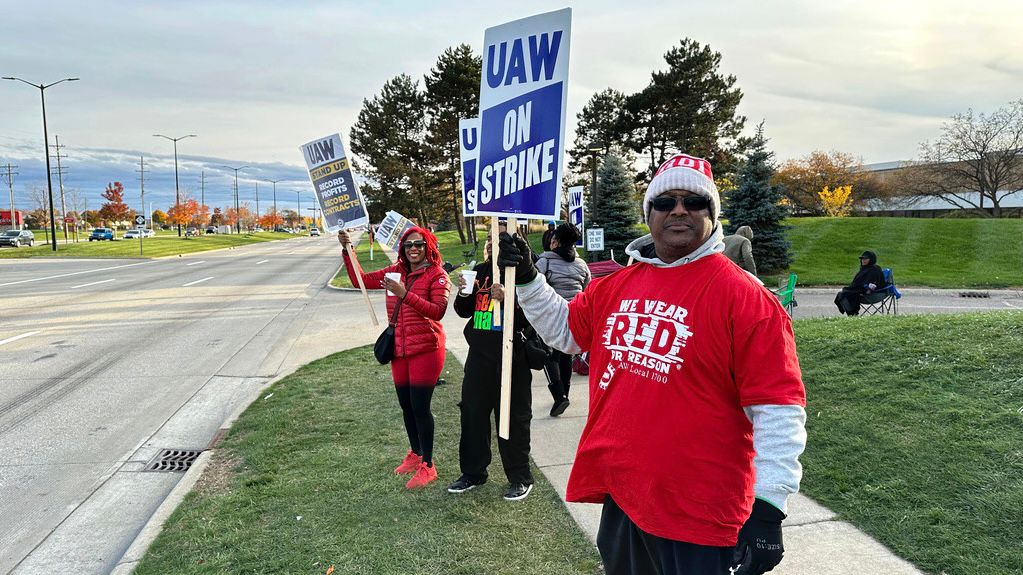The United Auto Workers filed federal labor charges against Honda, Hyundai and Volkswagen on Monday, UAW President Shawn Fain said during a Facebook Live event with members. Fain accused the companies of intimidating, coercing and surveilling workers who were starting unionization efforts at non-union plants.
The charges come less than a month after UAW workers at the Big Three Detroit automakers ratified record contracts that yielded 25% wage increases and other significant benefits that have inspired workers to sign union authorization cards at many non-union car companies that build vehicles in the United States.
“The Big Three say they can’t compete with non-union companies that keep wages and benefit so low, so we’re going to help them out with that problem,” Fain said. “We’re going to raise a standard across the country instead of lowering it. Once autoworkers everywhere make a fair wage with decent benefits and real job security, companies won’t be able to pit auto worker against auto worker to compete with one another for more profit.”
Shortly after winning deals with the Big Three, Fain began calling on workers at Tesla, Toyota, Honda, Hyundai and other companies to begin organizing unions.
“Just like our stand-up strike, no single company is going to be a target,” Fain said. “They’re all the targets. Just like our stand-up strike, they won’t know what’s coming next.”
Thousands of non-union auto workers at 13 companies have heeded Fain’s call. Last week, over 1,000 workers, or roughly 30% of the workforce, at a Volkswagen factory in Chattanooga, Tenn., announced they had signed union authorization cards. Fain said VW has responded by confiscating UAW flyers in the factory’s breakrooms and holding meetings with anti-union talking points, prompting the union to file federal charges.
Volkswagen has not yet responded to Spectrum News’ request for comment about the labor charges. Last Friday, it said on its website that the company had recently increased wages at the Chattanooga factory by 11%. “We also respect the right of our workers to determine who should represent their interests in the workplace,” the company said.
The UAW lodged similar union-busting claims against Hyundai, saying a worker’s pro-UAW flyers at an Alabama plant were thrown in the trash and were countered with someone handing out anti-union flyers and T-shirts.
“Hyundai Motor Manufacturing Alabama team members may choose to join a union or not as is their legal right, and this has been true since our plant opened in 2005,” a Hyundai spokesperson told Spectrum News. “Our commitment to our employees is demonstrated by offering world-class benefits, competitive pay, a safe working environment, and opportunities for career acceleration. The union’s characterization of events in its press statement do not present an accurate picture, and we look forward to having a fair opportunity to present the facts through our participation in the legal process.”
Last month, Hyundai announced it would increase wages by 25% over four years at its Alabama and Georgia factories. Over the last month, several other non-union car makers have also announced pay raises, including an 11% raise at Honda and a 9% raise at Toyota, all of which Fain referred to as “pocket change” that still resulted in “poverty wages.”
“Toyota, the most profitable auto company in the world, has set up a food bank for its own workers here in the United States of America,” said Fain, who met with dozens of workers at the Japanese automaker’s largest U.S. factory in Georgetown, Ky., last week.
He said the profits Toyota made over the last decade were more than the Big Three Detroit automakers combined. The Japanese automakers made $480 billion over the past ten years, while BMW, Mercedes-Benz and Volkswagen have made $460 billion in profits, according to the UAW.
Toyota has not yet responded to Spectrum News’ request for comment about the food bank.
Fain is advocating for what he calls a 30-50-70 strategy as non-union auto workers begin to organize. When 30% of a plant’s autoworkers sign union cards, they’re ready to go public with their organizing strategy. When 50% sign, Fain said he would personally join them for a rally. When 70% sign and have built a strong organizing committee with representatives from every department, Fain said the UAW will demand the company recognize the union or take it to a vote.
“One thing sets apart winning and losing organizing campaigns,” Fain said. “The workers have to want it, and right now, America’s auto workers are ready.”



